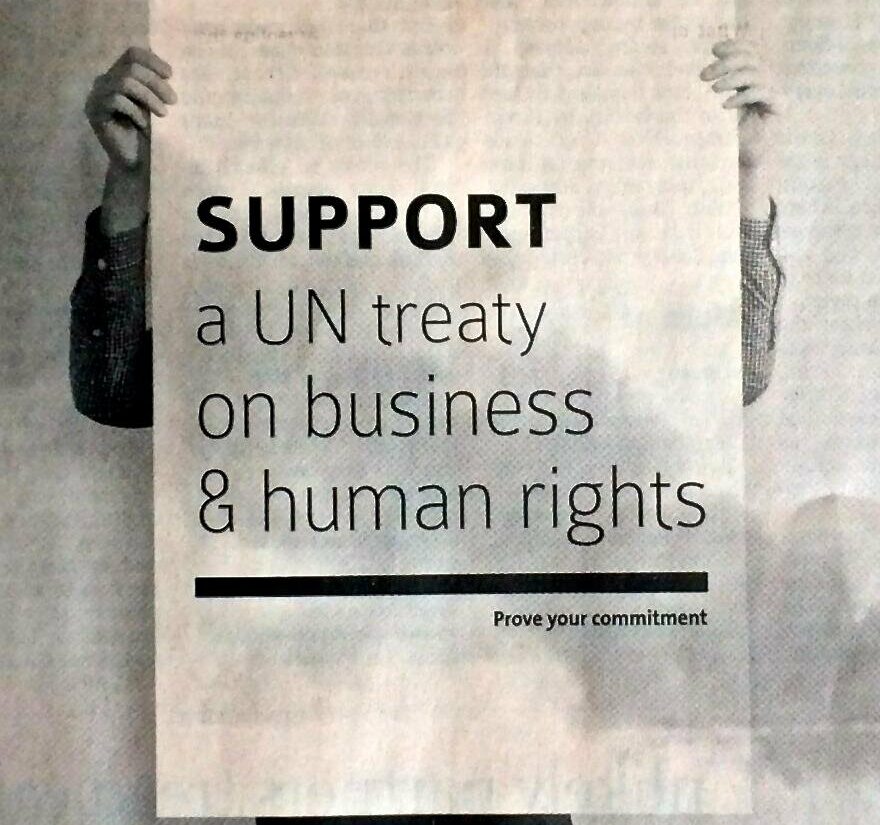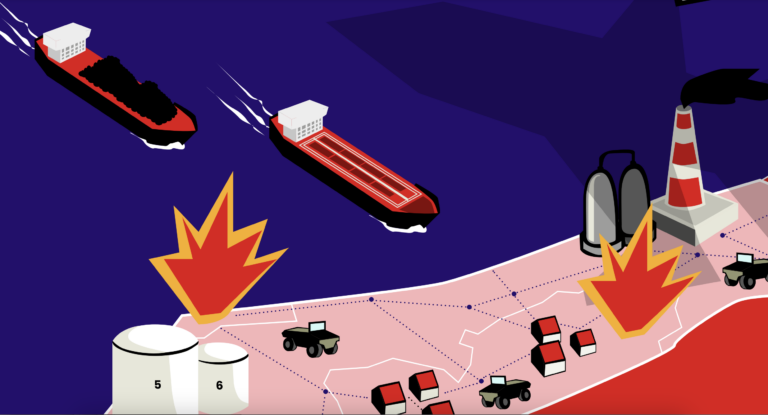
UN treaty on business and human rights: A historic opportunity to ensure effective remedy for victims
For decades, communities have been bearing the brunt of corporate misconduct without any proper access to remedy. On a daily basis, people have been risking (opens in new window) their lives in order to protect their land, their livelihoods, the environment and their rights as workers. Often, communities stand alone on the frontline – with international human rights standards on their side, but without (judicial) enforcement to back them up.
At the international level, states have signed and ratified numerous human rights treaties, covering a wide spectrum of rights, including civil and political rights, social and economic rights and labour rights. The adoption of the UN Guiding Principles on Business and Human Rights (UNGPs) in 2011 signified a consensus among states regarding the application of human rights standards to states (primarily as regulators, a protective force) and companies (as economic actors with social impacts) in the context of business. However, there is no system in place to hold corporate actors to these international standards, despite their global activities and (often severe) impacts on human rights and the environment.
Currently, victims of business-related human rights abuses face numerous obstacles when trying to access remedy. Removing Barriers to Justice, a report co-commissioned by SOMO, gives an overview of several obstacles, illustrated by analysis of transnational business and human rights litigation. Firstly, issues regarding forum selection, the legal applicable framework and extraterritorial jurisdiction can result in victims not being able to access the courts in their home state or in the host state either. Once able to access court, legal barriers – specifically the corporate veil – can effectively shield the parent company from liability for the acts of its subsidiaries.
After the case has reached substantive review, the lack of criminal liability provisions or binding due diligence requirements makes it challenging to hold companies to account for their acts and omissions causing harmful impacts. Safety concerns, the lack of financial resources and lack of access to information, combined with a burden of proof, form a significant obstacle between affected individuals and communities and courts, which is equally detrimental to victims’ cases. Finally, the willingness and ability of domestic agencies to enforce the limited existing laws in relation to corporate misconduct both remain issues of concern.
Research(opens in new window) by other organisations like Amnesty International and the Business & Human Rights Resource Centre continues to show that legal change is needed in order to address systemic issues underlying barriers to justice, including parent company liability, duty of care and mandatory human rights due diligence.
So what change could and should a treaty bring?
A treaty needs to create an international framework for jurisdiction and choice of law for transnational business and human rights cases, decreasing the likelihood of jurisdictional battles. Removing legal barriers to corporate liability, the treaty should also establish parent company liability and criminal liability for corporate offenders, as well as a binding duty of care related to companies’ subsidiaries and supply chain.
The due diligence framework set out by the UNGPs can be given legally binding force, with a vision to improve corporate planning, oversight and transparency. Critical to protecting lives and a safe space for civil society, the treaty needs to extend protection to human rights defenders, possibly through the introduction of libel law reform, judicial protection for whistle-blowers and firmly establishing community participation in relation to business projects.
Improving victims’ access to courts, the treaty can include provisions on financial and legal support for plaintiffs, reversed burden of proof and victims’ access to information. Last but not least, an internationally binding instrument should address the weak links in domestic legal systems by creating agreement on judicial cooperation, mutual recognition and enforcement of judicial decisions, strengthening domestic agencies in responding to transnational cases, stipulating effective sanctions to be imposed by domestic legal processes and establishing an effective global oversight body on implementation of the treaty.
The current state of play, lacking corporate accountability, is not a matter of legal feasibility or the lack thereof. It is about political will. States need to decide that – effectively – no corporation is above the law, and – effectively – no corporate interest shall be placed before human rights. Enforcement provisions(opens in new window) and implementation (opens in new window) of the widely adopted UN Convention against Corruption is one case in point. As a result of this Convention, states have put in place a multitude of preventive measures and established liability of legal persons (e.g. companies) for offences set out in the Convention. Furthermore, under this Convention states have undertaken collaborative actions – for the purpose of implementation and enforcement – including international cooperation (i.e. mutual legal assistance), technical assistance and information exchange.
Where companies are abusing human rights, remedy remains rare and is often limited to the use of non-judicial grievance mechanisms. The UN treaty process represents a historic opportunity to address existing gaps at the international level, ensuring victims’ access to effective remedy and putting an end to corporate impunity through the establishment of effective enforcement mechanisms. Whether through the use of domestic courts, the establishment of a transnational court and/or a global oversight body, the added value of the treaty will – among other things – be measured by the remedy it delivers on the ground.
In its report(opens in new window) on the right to an effective remedy, the UN Working Group on Business and Human Rights emphasises that rights holders should be central to the entire remedy process, if there is to be access to effective remedy. Furthermore, the effectiveness of remedies concerns both process and outcome: if the rights holders are not satisfied at the end of the remedial process, no remedy was achieved.
Whether caused by a corporate activity that’s transnational or domestic in nature, victims ought to have access to effective remedy. Without effective remedy on the ground, the treaty will fail the very people it is supposed to serve. We need a step up from the UNGPs; a step that moves us from voluntary commitments to binding and enforceable obligations.
This blog was published on the website of Business & Human Rights Resource Center(opens in new window)
Do you need more information?
-

Lydia de Leeuw
Researcher
Related news
-
 The hidden human costs linked to global supply chains in ChinaPosted in category:News
The hidden human costs linked to global supply chains in ChinaPosted in category:News Joshua RosenzweigPublished on:
Joshua RosenzweigPublished on: -
 The power to extract value from the value chainPosted in category:Long read
The power to extract value from the value chainPosted in category:Long read Rodrigo FernandezPublished on:
Rodrigo FernandezPublished on: -
Powering injustice Published on:
 Lydia de LeeuwPosted in category:Publication
Lydia de LeeuwPosted in category:Publication Lydia de Leeuw
Lydia de Leeuw

